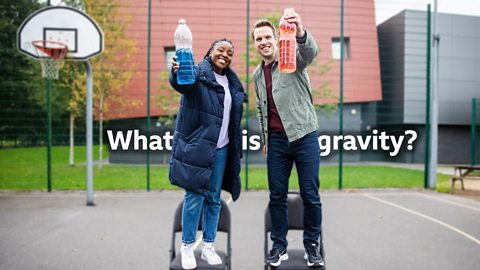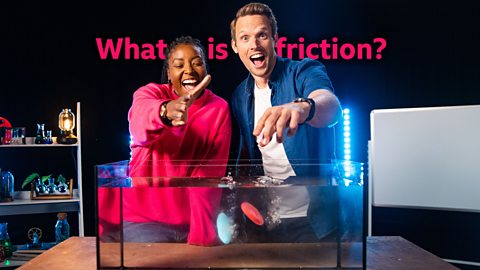MUSIC PLAYING
This is so cool!Boom!Hi, everyone, I'm Mwaksy.Hey, I'm Greg. I love magnets, don't you?Yeah, for sure. They're so cool.If you look at it like this, because of how they're floating,it looks almost like a magic trick. Yeah, it's like levitation for real.Yeah! But be honest, how exactly are they floating?OK, so what do you know about magnets?Well, I know magnets push or pull,so I'm guessing that each pair of magnetsis pushing against each other,which is what's making them float?
Spot-on.When magnets push apart like this, we say that they repel,and when they pull together, we say that they attract.Nowadays, we can make magnets in factories,but the very first ones were actually rocksthat people found in the ground. No way!Natural magnets in the ground? Yeah.You can actually find something magnetic in something you eat too.Oh! Greg, show me the science.
All right, then.This demo requires a bowl of cereal. Yummy! Mmm.What I've done is I've crushed all that cereal upinto small pieces, like this.And I'm going to pour all that into a bag. Mm-hm.Where's the milk? Ah.For this one, I'm going to use water instead of milk.Yeah, it's weird, but bear with me.Ready? Mm-hm.Is this how you have your cereal, out of a bag, with water?Out of a bag, ugh! No, it's not.Question, though. Yes? What has all this got to do with magnets?You will see in about ten minutes' time.There we go.OK. I mean, it still looks like a wet bag of cereal.Yup. I don't really know what's going on here.Right. Here, I've got a really strong magnet. Yeah.I'm going to put it over the wet bag of cereal,what do you think is going to happen?Genuinely? Ain't got a clue, me.Here we go.Just takes a little bit of time…Yes! What's happening?See all of this here?
MWAKSY GASPS
You see the dark bit at the top?Are you joking me?Is that from the cereal? Yeah.So, that is iron.Iron is a mineral that is really useful and important for our body,but it's also magnetic, it gets attracted to the magnet.And that's come out of the cereal? That's come out of the cereal.I never knew that was in my cereal.Cereal will never be the same.So, Greg, besides getting iron out of cereal,are magnets actually useful for anything?Yeah, so useful.They're in compasses that point to the magnetic North Pole,they're in MRI -magnetic resonant imaging machines - in hospitals,that we use to look inside our bodies,and they're super important in electronicslike computers and mobile phones too.I've just thought of another thing that magnets are really good for.What's that? Sorting! Who loves tidying their bedroom?Er, no, not me.OK, me neither, but I do love to recycle.When our recycled bottlesand packets get to a recycling plant, a big magnet is usedto help separate the different types of materials.The magnet attracts some of the metal recycling,lifting it off the conveyor belt and leaving everything else behind.Ooh, that gives me an idea for a demo. You up for it? Oh, yeah.I thought we could play a little game of magnetic fishing. Yay!On the end of each of our fishing rods,there is a magnet.The aim of the game is to fish outas many pieces of metal from this pile of rubbishas possible in ten seconds.Whoa! Ready? OK.
TOGETHER: Three, two, one… Go!
Yes!Ooh!It's not working!Oh! I was trying to get this one, but it's not working.Yeah, sorry, I might have cheated a little bit there. Greg!This is an aluminium can,and aluminium is not attracted to a magnet.Oh, yeah, of course!The other metal is made of steel, and steel contains ironjust like our cereal, so it is attracted to the magnet.Ah! OK, that all makes sense in my brain.Now we know all about magnets and why they're useful,I think you should ask them a question.OK, here's my question.This is the game that we designed,but what game could you design using magnets?I like that one! I like that one, yeah.We'll see you soon, bye! See you.
Video Summary
Mwaksy and Greg observe how magnets attract or repel each other and attract some materials and not others. They explore the behaviour and everyday uses of magnets and create and design a game using magnets and magnetic materials.
This short film looks at magnets, where they come from, and where magnetic materials can be found. Greg tells us about magnetic attraction and repulsion and investigates how to find the magnetic material in cereal. After finding out where we can see magnets in our daily lives, Mwaksy and Greg race each other to see who can use a magnet to fish more ferrous metal out of their rubbish - ready to be recycled.
Forces and electricity is a series of short films and teacher resources for primary schools, following presenters Mwaksy Mudenda and Greg Foot as they use demonstrations, experiments and animations to learn about forces and electricity.
Teacher Notes
Before watching the film:
Prior to this lesson you may wish to introduce students to other relevant topics, for example:
During the film:
Depending on your lesson’s focus, you may wish to pause the video at certain points to check for understanding, asking questions such as:
- Have you seen a magnet before? Where was it, and what was it used for?
- How could you find out whether your cereal is magnetic? Could the box give us any clues?
- What other materials could Greg and Mwaksy fish out using their magnets?
- Which materials aren’t magnetic?
Final question:
How could you design a game using magnets?
Discussion points for the final question:
- What are magnets good for? What are their useful properties? For a cross-curricular link, think about designing clothes with magnets, including backpacks and watch straps.
- What sort of games do you like to play?
- How many people could play your game? How would they win or lose?
- What other materials would you need to make your game work?
- Will your game use attraction, or repulsion, or both?
Following on from the film:
- If you have access to magnets, try seeing what materials in the classroom are magnetic.
- Before they start, ask your students to make predictions about what materials will be attracted to (or repelled by) the magnet. Can they find anything they would expect to be magnetic, that isn’t?
- You could also try making your own floating compasses using a needle or paperclip.
Please follow appropriate safety guidance if using magnets. has information about magnet safety.
This short film is suitable for teaching science at KS2 in England, Wales and Northern Ireland and 2nd Level in Scotland.
What is gravity? video
Mwaksy and Greg learn about what gravity is using bottles and air rockets.

What is friction? video
Mwaksy and Greg learn about friction, air resistance and water resistance, and see them in action.

What are levers? video
Mwaksy and Greg learn what levers are, what the different parts are called, and how they work.
